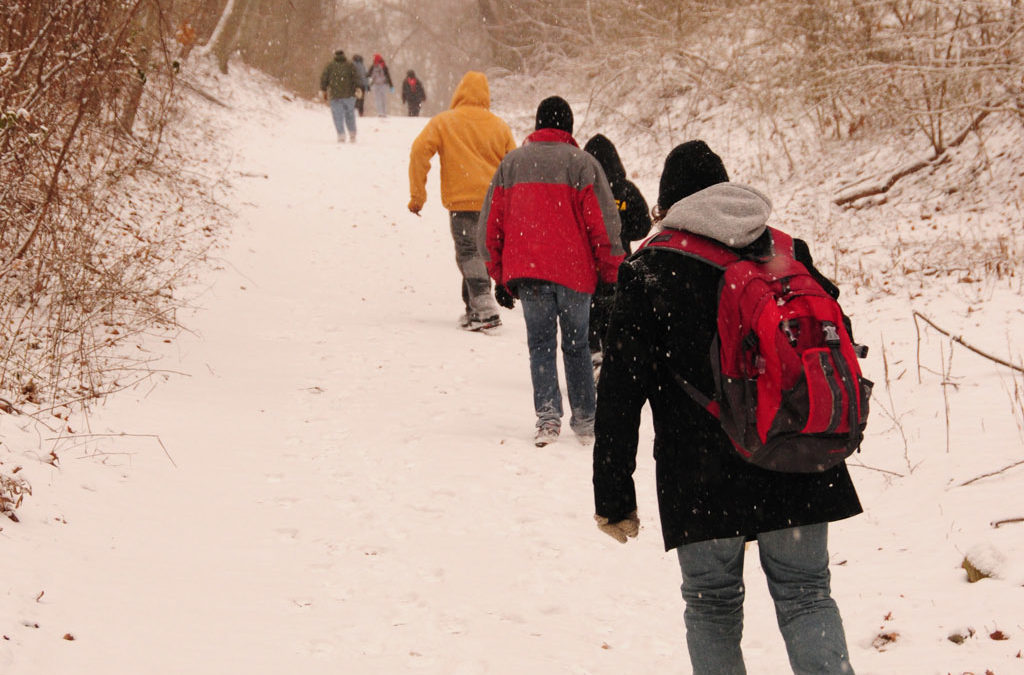
by North Shore Child & Family Guidance Center | Dec 18, 2018 | Blog
Holidays gatherings can be among the happiest times of the year. But the reality is, these family get-togethers can also bring up all sorts of conflicts. Old wounds from the past (“Mom always liked you best!”), differences on parenting styles (“You really shouldn’t let your kids listen to that music, dear”) and, especially these days, disagreements about politics (“I can’t believe you voted for fill in the blank!”) can turn what should be a happy occasion into a battlefield.
When children and teens are part of your holiday celebrations, it’s especially important that you model good behavior, according to Elissa Smilowitz, LCSW and Coordinator of Triage and Emergency Services at North Shore Child & Family Guidance Center. “Family members should keep in mind to be respectful about other family norms and values that might not be the same as yours,” she says. “Differences of opinion are common and should be viewed respectfully.”
Here are some tips to help you get through the holidays without a whole lot of hollering.
- Set realistic expectations. The image of the perfect family gathering is just that—an image. That uncle who just can’t seem to get through the meal without telling a joke that rubs you the wrong way isn’t likely to miss the opportunity to share his witticisms. Who knows? You may end up being pleasantly surprised, but if not, try not to dwell on the not-so-perfect moments.
- Accepting that things won’t necessarily go exactly as planned is different than accepting truly obnoxious or hurtful behavior. If you have a family member who consistently ruins holidays by picking fights or insulting others, you have every right to remove him or her from your guest list. You are not required to subject yourself or your children to unacceptable behavior.
- Are politics a particularly hot-button issue in your family? Then it might be wise to set a rule ahead of time that all-things-political are off limits—at least during the season’s festivities. You’re not compromising your principles, but rather just agreeing that this isn’t the best time to get into any likely heated debates.
- Is your child or teen a screen addict? Let them know that phones are not invited to the holiday table. Encourage them to take part in family activities such as board games. They’ll survive the temporary tech blackout.
- Prep your kids on how to accept a gift graciously. It’s very possible that the scarf and mittens that Grandma and Grandpa picked out might disappoint your little one, who was hoping for something less practical and more fun. It’s a smart move for you to explain ahead of time that saying “thank you, I really love it” does not violate your policy on truth-telling.
- Although this season is one of the most anticipated times of the year for many kids, it can also be overwhelming. Try to maintain their routine as possible, including bedtimes, naps, meals, playtime, etc.
- Let your children help with decorating, baking, wrapping presents and other items on our holiday to-do list. Even little ones can put their finger on the ribbon so you can tie a bow. They’ll feel very proud when they tell their favorite aunt that they played an important role in making her gift so special.
- No one knows your children better than you. If they are very sensitive to crowded, noisy places, then maybe the mall isn’t a great place to bring them during the holiday rush. If they are high energy, make sure to plan a visit to the playground or skating rink. Does sitting quietly and reading a book help your shy or anxious child to feel calm? Then build in time specifically for that kind of activity. Acknowledging your child’s needs and helping them learn skills to self-soothe will go a long way toward making this holiday season a joyous one.
From all of us at North Shore Child & Family Guidance Center, we wish you a happy, healthy holiday!

by North Shore Child & Family Guidance Center | Dec 13, 2018 | Blog
Today’s family comes in a variety of forms, with divorce and remarriage increasingly common. Given these many combinations, making plans for the holidays can be complex. Which parent gets the kids and when? How do exes divide up the gift lists? Those are just a hint of the many issues that come up this time of year.
Whether your relationship with your ex is amicable or not, your job as co-parents gets trickier when trying to divvy up the details that come with holiday festivities.
“The best advice for parents is to try to work together to lessen any additional stress on the child,” says Dr. Sue Cohen, Director of Early Childhood and Psychological Services at North Shore Child & Family Guidance Center. “This includes avoiding confrontations and not putting the other parent and extended family members down.”
Following are 12 tips on keeping the holidays joyful for everyone involved.
- Put your kids’ happiness first. If you have nothing but animosity for your former spouse, put it aside so your kids can experience the holidays as a fun-filled, loving time of year.
- Don’t make gift-giving a competition. If your kids make a wish list of gifts they are hoping to receive, go over it with your ex and come up with an equitable division of who gives what.
- Help your child select a gift for the other parent (and, if you think it’s appropriate, to the stepparent and stepkids, if there are any). This small but gracious act will help make your child feel more secure, as well as serve as a model of kind behavior.
- While gifts are a big part of most families’ holiday tradition, remember that the best thing you can give your child is attention and love. Getting the latest “must have” toy won’t be what they remember in years to come, but the special times you share together will hold a fond place in their memories.
- Let your children know that you want them to have a terrific time with their other parent. While your child’s well-being should be your goal year-round, it’s especially important that, at holiday time, they know you’re happy that they’ll be spending time with their dad or mom, even if that means that you will be spending some time on your own.
- Make plans well ahead of time. You don’t want both you and your ex to plan dinner with the grandparents, aunts, uncles and cousins on the same night.
- Speaking of, don’t plan too much activity on any one day, especially if you have little ones. You’ll end up with exhausted kids being shuffled from one house to another.
- Keep family traditions alive. If you’ve baked cookies each year, your kids would be terribly sad if you didn’t do the same this year. Also, think about creating some new, special traditions.
- If you and your spouse don’t live near each other, consider alternating holidays year to year.
- When the “negotiations” about times and dates and events aren’t terribly friendly, plow through with as much graciousness as you can muster. Make compromises—and don’t ever put the kids in the middle!
- If your relationship with your ex is on relatively friendly terms, consider spending part of the holidays together as a family. Your children will fare far better in the long run if they don’t feel that they have divided loyalties between the two most important people in their lives.
- Finally, don’t forget to take care of yourself. When you maintain your routine and get enough sleep, exercise, healthy food, etc., you will not only feel better but your kids will benefit as well.
If your child is struggling with issues surrounding divorce or experiencing any emotional challenge, North Shore Child & Family Guidance Center is here to help. Contact us at (516) 626-1971. Happy Holidays!
by North Shore Child & Family Guidance Center | Dec 11, 2018 | In The Media
The recent death of our 41st President George H.W. Bush brought forth a memory from my earlier years at North Shore Child and Family Guidance Center. For decades I worked as a frontline clinician in the Guidance Center’s outpatient mental health program. My specialty was working with adolescents in groups.
One of the lessons I learned over the years is the importance of paying attention to what is happening in the world that might impact on kids’ day to day lives. On Jan. 16, 1991, 18 hours after the deadline for Saddam Hussein’s Iraqi forces to leave Kuwait, my boys’ group arrived for their weekly meeting.
The boys, ranging in age from 12 to 14 years old, were too young to have experienced the Vietnam War, yet were old enough to have been exposed to growing threats of war and terrorism. War was on their minds. They talked of cruise missiles, B-52’s, stealth bombers. They were like Nintendo warriors, I thought to myself.
One of the group members Tony said, “I’m afraid we’ll be bombed, we might be hit, I can see World War III coming. What if there’s a nuclear war?”
As the discussion progressed, the boys agreed that little protection existed against terrorism.
The group railed about how “everything is falling apart.” They seemed to have little faith in adults’ and authorities’ ability to protect them.
Rick, who could’ve easily passed for 17, said, “You guys will probably think I’m a wimp, but I’m scared s***less.”
When I asked the others in the group if they thought Rick was a wimp, they said “no” and revealed that they, too, were scared. I told them that war is scary and that it takes a lot of courage to be supportive.
When the meeting ended, the boys started walking out at a few minutes past seven. I flicked on the radio in time to hear President Bush’s press secretary Marlin Fitzwater announce: “The liberation of Kuwait has begun.” Moments later the boys burst through the door yelling, “They started dropping bombs!”
Rick, who bragged about an anticipated “hot date,” said he was going home to hide in his basement. Kenny’s eyes filled with tears. “My mom’s not here yet,” he said. “I’m scared. Can I stay with you ‘til she gets here?”
I motioned for him to sit down. An airplane passed overhead, and the tears began rolling down his cheeks. He said, “Every time I hear a plane, I’m afraid it will drop a bomb. I was afraid of the dark when I was little.”
My reassurances were interrupted by the buzz of the telephone and the message of the arrival of his mom, his former foster mother who adopted Kenny, providing him with the stability, consistent care and nurturing that he had been lacking in his early years.
Without hesitation Kenny, about half my size, gave me a bear hug and, burying his head into my midsection said, “Thanks Andy, I hope to see you next week.” I reaassured him that he would. As I escorted him down the winding staircase with my arm around his shoulder I could feel him trembling. Or was it me?
When I was in the seventh grade the news of President Kennedy’s assassination came to us through the classroom intercom. Twenty-eight years later, the news of the war with Iraq arrived again through a disembodied voice, this time through a radio. At 12-years-old the news was followed by no human interaction, only blank stares and a gasp punctuated silence.
We were dismissed and I returned home to an inescapable eeriness that I remember sharply to this day. And now the world stage was again intersecting with a gathering of seventh graders. As I look back to the boys’ group I felt privileged to have been in a place that provided more than blank stares and silence.

by North Shore Child & Family Guidance Center | Dec 5, 2018 | Blog
During the holiday season, it seems that spending time appreciating the beauty of the natural world takes a backseat to hitting the shopping malls and hunting for bargains online.
That’s a shame, because being in the outdoors provides huge benefits in every season of the year. The healing power of nature is why North Shore Child & Family Guidance Center created our Wilderness Respite Program, which this year celebrates its 20th anniversary.
The Wilderness Respite Program provides a unique opportunity for at-risk adolescents—some of whom have issues such as depression, anxiety and autism—to put down their tech devices and head outside to participate in hikes and other nature activities that foster individual growth, leadership skills, self-esteem and friendships while also promoting environmental stewardship.
During one of the planning meetings for an upcoming hike, a few of the boys tried to take control of the situation by dominating the other group members through physical posturing and verbal banter. That all changed once the teens drove to the state park and departed from the van. We found ourselves immersed in the forest, with no pavement, stores, traffic lights or any of the usual trappings of the home neighborhood—the kind of pure, natural environment many of the teens had rarely if ever experienced.
Little by little, all of the teens learned to work together, decoding the trail markers located on trees and rocks. Relying on their growing awareness of themselves and the direction of the staff, the teens gradually learned to hike at a controlled, measured pace, rather than starting out in a sprint and tiring as the day wore on. Although this was emphasized during preparation meetings, it was in the “doing” that this learning was integrated by the hikers, who soon learned how easy it was to get worn out.
The hike was a challenging one, lengthy and with rough terrain. It was an experience most of the teens felt was beyond their capabilities, but once they realized they could overcome these perceived limitations, they felt exhilarated. They also developed a noticeable respect, admiration and affection for each other. Tired and done-in, the group gathered around some rocks, leaning on one another for support, warmth and belonging.
Self-discovery took another turn on a canoeing trip by the same group earlier in the fall. The teens were faced with strong winds and an unfriendly current as they attempted to learn basic canoeing skills on Long Island Sound. All of them experienced a great deal of frustration, disappointment and anger as they struggled in teams to control the direction and progress of their canoes. They learned that the elements and obstacles proved too formidable on that day for us to reach our destination, when after three hours of tiresome paddling, we needed to turn around and paddle back to our starting point, rather than continue to our original destination six miles away.
But the trip wasn’t by any means a failure, because learning how to handle disappointment is just as valuable as experiencing success. The group learned that when the challenges of the wilderness became tiring and weather conditions on the water became burdensome and oppressive, they had to reach inside themselves to summon up additional strength to overcome frustration, anger and fear. So, even though the trip had more than its share of disappointments, the teens were able to carry over the feeling that they could handle it when things don’t go smoothly.
These wilderness outings to excursions on both land and sea were successful because they all serve to prepare the teens for unknown challenges ahead.
For more information about the Wilderness Respite Program, contact Director Bruce Kaufstein at (516) 626-1971, ext. 316.
Portions of this story, which was written by Guidance Center Executive Director Andrew Malekoff, were originally published in Anton Media.

by North Shore Child & Family Guidance Center | Dec 3, 2018 | Press Releases
 (From left) Honorees Andrea and Michael Leeds, Congressman Tom Suozzi, honorees Rita and Frank Castagna, state Sen. Todd Kaminsky and honoree Deirdre Costa Major contributed to the success of North Shore Child & Family Guidance Center’s 65th Sapphire Anniversary Gala.
(From left) Honorees Andrea and Michael Leeds, Congressman Tom Suozzi, honorees Rita and Frank Castagna, state Sen. Todd Kaminsky and honoree Deirdre Costa Major contributed to the success of North Shore Child & Family Guidance Center’s 65th Sapphire Anniversary Gala.





 (From left) Honorees Andrea and Michael Leeds, Congressman Tom Suozzi, honorees Rita and Frank Castagna, state Sen. Todd Kaminsky and honoree Deirdre Costa Major contributed to the success of North Shore Child & Family Guidance Center’s 65th Sapphire Anniversary Gala.
(From left) Honorees Andrea and Michael Leeds, Congressman Tom Suozzi, honorees Rita and Frank Castagna, state Sen. Todd Kaminsky and honoree Deirdre Costa Major contributed to the success of North Shore Child & Family Guidance Center’s 65th Sapphire Anniversary Gala.